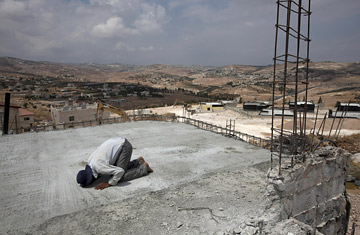
The Obama Administration likes to imagine its Middle East peace process is in a holding pattern until after the midterm elections — but a holding pattern implies momentum, a quality conspicuously lacking in the current negotiations between Israel and the Palestinians. Instead, the Administration's effort has effectively stalled at the first hurdle: the impasse over Israel's continued settlement construction which the Palestinians say prevents them from returning to the table. The situation offers more evidence that the gulf between the two sides is too great to bridge by simply talking things out. Amid mounting frustration, Palestinian leaders have begun telling the world that they are considering taking matters to the U.N. Security Council — emphasis, of course, on considering.
The Palestinian leadership believes that the current Israeli government has given no indication that it will offer what Palestinians would consider to be a credible peace agreement absent pressure from Washington. And they have grown exasperated at a U.S. mediating role perennially tilted — for domestic political reasons — in Israel's favor. The spectacle of the Obama Administration in recent weeks offering the Israelis such far-reaching inducements as U.S. support for long-term Israeli military control of the Jordan Valley even after it becomes part of a Palestinian state, just to keep talks going for another 60 days, underscores Palestinian pessimism over the current process. That's why, Palestinian officials report, they have begun debating whether to take their case against Israel's settlement construction, and even their demand for a state based on Palestinian territory outside Israel's 1967 borders, to the U.N. Security Council.
Relying on international law rather than on the good offices of the United States certainly has some advantages. While U.S. officials tend to use euphemisms such as "unhelpful" when describing Israeli settlement construction on land conquered in the 1967 war, even the mild-mannered U.N. Secretary General Ban Ki Moon made clear, earlier this month, that "all settlement activity is illegal anywhere in occupied territory" and demanded an immediate halt to all Israeli construction in the West Bank and East Jerusalem. No government in the world supports Israel's settlement policy, so taking the matter to the Security Council would arguably be a slam-dunk.
Nor should the Palestinians have much trouble persuading the Security Council that the 1967 borders are the basis of a Palestinian state — Israel's declaration of independence in 1948 claimed recognition of its own statehood by referring to a 1947 resolution to partition the Holy Land into separate Jewish and Arab states. No Arab state came into being, of course — the 1948 war changed the contours of partition to give Israel a substantially bigger share than that envisaged by the U.N. plan, while the West Bank and Gaza were occupied by Jordan and Egypt respectively in 1948, and then by Israel in 1967.
The prospect of the geographical extent of Palestinian statehood being settled in a forum where Israel's overwhelming advantages (forces on the ground, and Washington's political influence) are negated by an international consensus sympathetic to the Palestinian case, has prompted some anxiety among Israel's leaders and their American supporters. "Any attempt by the Palestinians to circumvent [the Obama Administration's] process by going to international organizations is not realistic and will not in any way advance the peace process," warned Israeli prime minister Benjamin Netanyahu earlier this week. And Anti-Defamation League President Abraham Foxman, a strong Israel supporter in Washington, urged the Obama Administration to "close every exit door" for the Palestinians from the U.S.-run process by making clear the U.S. would oppose the U.N. route — Washington has veto power in the Security Council.
Foxman and Netanyahu may have no immediate need to worry, however. While the PLO leadership is discussing going to the U.N. as an option, the organization's Washington ambassador Maen Areikat on Wednesday told TIME that his organization "remains committed to bilateral negotiations with the Israelis" as its basic approach to seeking Palestinian statehood. And he emphasized that going to the U.N. would not be a step taken "unilaterally," but "would have to be coordinated with the international community, and with the United States, in order to achieve success." Translation: The Obama Administration still holds effective veto power over whether the P.L.O. takes the matter to the U.N.
The downside of the Palestinian U.N. option, of course, is that while U.N. recognition of a state based on the 1967 borders would "give" the Palestinians more territory than they might achieve in a U.S.-mediated negotiation process, the international body would not address the problem of getting Israel to concede possession — and the "facts on the ground" created by Israel since 1967 include nearly half a million Israelis living on occupied territory, more than 200 settlements and outposts, and roads reserved for Israeli use that reduce the Palestinian-controlled West Bank to a kind of fragmented camouflage pattern. So getting U.N. recognition of Palestinian statehood on the 1967 borders would establish a principle, but brings its implementation no closer — and would probably be the prelude to a protracted struggle between the two sides.
The history and political interests of the current Palestinian leadership, which has shown little appetite for confrontation with Israel, suggest that the prospect of going to the U.N. may be being dangled in order to press the Obama Administration and the Israelis on the settlement freeze and also to make the 1967 borders the basis of negotiations. But even if turns out to be an empty threat for now, the arc of events suggests that the view is growing — although not a consensus — even within the PLO leadership that relying on bilateral talks with the Israelis, mediated by the United States, is a strategy of diminishing returns.
